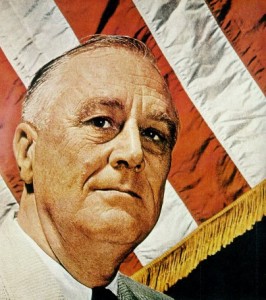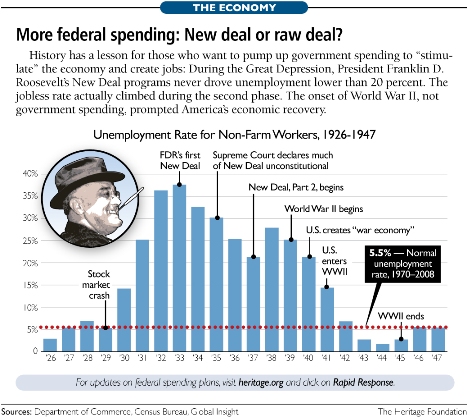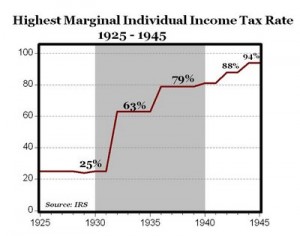 (Please see Part I first if you have not done so already)
(Please see Part I first if you have not done so already)
Franklin Delano Roosevelt entered office on the heels of the 1932 collapse of the American Financial system. The floor fell out of the economy. At the time of the November election, unemployment stood at 31% and the GDP fell from $104 billion in 1929 to 76$ billion, and agriculture prices fell 61% from 1929 to 1933. Over 5,000 banks closed their doors in 1933 taking $3.4 billion with them.
The situation when FDR took office, was perilous. Unemployment rates were astonishing: 50% in Cleveland, 60% in Akron, 80% in Toledo, and 90% in Gary (Indiana). The suffering was nation wide, New York City reported 95 people starved to death in 1932.
During his 100 days FDR moved quickly to get the National Relief Act in motion and stabilize the banks. If you look at the chart (below) the downward trend in unemployment after FDR’s election seems to indicate that his actions early on stopped the bleeding. Indeed, I would lean toward that conclusion. The banks were neglected by Hoover and FDR reacted to that need.
 Folsom states that “Capitalism had failed in FDR’s view” and I do not agree. FDR was not anti-capitalism. Left wing Progressive economists argued FDR did not spend enough and did not maintain a high enough deficit. As a matter of fact, FDR was not even the socialist that his critics accused him of being. “The lessons of history, confirmed by evidence immediately before me,” said Franklin Delano Roosevelt, “show conclusively that continued dependence upon relief induces a spiritual and moral disintegration fundamentally destructive to the national fiber.” Not the words of a socialists. FDR was not anti-capitalism as Folsom believes and he would be shocked today if someone told him he was trying to turn America into a socialists state.
Folsom states that “Capitalism had failed in FDR’s view” and I do not agree. FDR was not anti-capitalism. Left wing Progressive economists argued FDR did not spend enough and did not maintain a high enough deficit. As a matter of fact, FDR was not even the socialist that his critics accused him of being. “The lessons of history, confirmed by evidence immediately before me,” said Franklin Delano Roosevelt, “show conclusively that continued dependence upon relief induces a spiritual and moral disintegration fundamentally destructive to the national fiber.” Not the words of a socialists. FDR was not anti-capitalism as Folsom believes and he would be shocked today if someone told him he was trying to turn America into a socialists state.
But yet the Keynesian philosophy that will be mainly followed by FDR had already failed by 1932. President Hoover was not a fiscal Conservative and many of the initiatives he started were apart of FDR’s New Deal. Hoover spent a lot of money and maintained huge deficits, $903 million for the 1931 fiscal year.
I believe that FDR surrounded himself with too many economist/theorists and not enough businessmen (indeed he included none) as Folsom does correctly point out. The National Industry Recovery Act overthrew America’s free market economy. FDR also declared war on the wealthy private businessmen who would have led the way out of recovery before World War 2. He raised taxes on the private and corporate sectors that created long term jobs. The short term reduction in unemployment (as shown in the graph) was probably do to the creation of government run jobs. But these job gains could not be maintained without high taxation without growth in the private sector, which did not happen.
 FDR did not want to run high deficits and decided to tax the wealthy; who were the small businesses and job creators. (Note: Had FDR took an initial hit on a high deficit in return for low taxes, expansion in the private sector would have probably brought in more tax money due to growth.) FDR taxed pretty much everyone, indeed, as those making less that 5K were hit with a 0.4% tax, and on up to those making over 100K who were taxed at a rate of sixty-five percent. Roosevelt even signed an executive order in 1942 taxing all people making over 25K at the astonishing rate of 100%, proving his dependency on tax and spend which never worked until the private sector was energized by massive stimulation due to the war. The President never completely understood the public business sector, which lead the way in recovery during WW2. In this regard, FDR was more a Progressive than a Socialist. He wanted the government to be the instigator of change.
FDR did not want to run high deficits and decided to tax the wealthy; who were the small businesses and job creators. (Note: Had FDR took an initial hit on a high deficit in return for low taxes, expansion in the private sector would have probably brought in more tax money due to growth.) FDR taxed pretty much everyone, indeed, as those making less that 5K were hit with a 0.4% tax, and on up to those making over 100K who were taxed at a rate of sixty-five percent. Roosevelt even signed an executive order in 1942 taxing all people making over 25K at the astonishing rate of 100%, proving his dependency on tax and spend which never worked until the private sector was energized by massive stimulation due to the war. The President never completely understood the public business sector, which lead the way in recovery during WW2. In this regard, FDR was more a Progressive than a Socialist. He wanted the government to be the instigator of change.
Still, lots of questions can be raised by the tax graph, as during WW2 taxation increased, yet the economy recovered, why? To be discussed in Part III.
Works Cited:
Roger Biles, A New Deal for the American People, 11-12; 22-23;31;104.
Burton W. Folsom Jr, New Deal or Raw Deal?: How FDR’s Economic Legacy Has Damaged America, 93, 130
Wow! I enjoyed your article. Is this not what we are doing today? Should not the end goal be a properous and free people? Mr. Bernacke is supposed to be an expert on The Great Depression. What is his problem? Don’t the experts read history? Government dependency never worked, . Now you have to ask the queston: is there another agenda?
Thank you.
Betsy some so-called experts will argue that the massive spending caused by World War 2 jolted us out of the Great Depression, and they would be partially correct. What has to accompany that massive spending is massive production. And today we have massive spending without the massive production. our economy is not designed that way anymore, it seems. Thanks for the comment. Chris